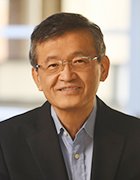
whyframeshot - stock.adobe.com
Intel appoints ex-Cadence CEO amid turnaround struggles
Intel appoints chip industry veteran Lip-Bu Tan as the next CEO responsible for revitalizing the struggling chipmaker and transforming it into a contract manufacturer.
Listen to this article. This audio was generated by AI.
Intel's board appointed chip industry veteran Lip-Bu Tan to lead the company as it struggles to regain market share lost to rivals over the last two decades.
Tan, former longtime CEO of Cadence Design Systems, will become Intel CEO on March 18. He will succeed interim co-CEOs David Zinsner and Michelle Johnston Holthaus, who replaced ousted CEO Pat Gelsinger last December, the company's board said Wednesday. Zinsner will return to his former position of CFO, and Johnston Holthaus will remain CEO of Intel Products.
"Lip-Bu is an exceptional leader whose technology industry expertise, deep relationships across the product and foundry ecosystems, and proven track record of creating shareholder value is exactly what Intel needs in its next CEO," said Frank Yeary, interim executive chair of the board, in a statement.
Tan has "more than 20 years of semiconductor and software experience as well as deep relationships across Intel's ecosystem," the company said. He served as Cadence CEO from 2009 to 2021. During his tenure, he doubled the company's revenue, expanded operating margins and oversaw a stock price increase of more than 3,200%, according to Intel.
 Lip-Bu Tan
Lip-Bu Tan
"Intel has a powerful and differentiated computing platform, a vast customer installed base and a robust manufacturing footprint that is getting stronger by the day as we rebuild our process technology roadmap," Tan said. "I am eager to join the company and build upon the work the entire Intel team has been doing to position our business for the future."
In 2024, Tan resigned from the Intel board after growing frustrated with the company's approach to manufacturing and its bureaucracy and risk-averse culture under Gelsinger, Reuters reported. Tan will rejoin the board once he becomes CEO.
Jack Gold, principal analyst at J.Gold Associates, praised Intel's board for choosing a CEO who understands the semiconductor industry from product design and manufacturing. Intel's manufacturing subsidiary, Intel Foundry, needs someone of Tan's experience to help make its manufacturing process more accessible to potential customers, Gold said.
The board's choice of Tan indicates that it's interested in keeping Intel's design and foundry businesses together under one company, Gold said. If the board wanted to split up the company, it would have chosen someone with more financial experience.
"Certainly, he has much to do to turn the ship around, but his appointment is a positive event, and hopefully, the board will stay out of his way as he makes needed changes," Gold said, noting that the company's turnaround will take as long as two years.
"Patience is required," he said.
Other chip manufacturers have reportedly considered a bid for Intel's manufacturing operations. Companies looking at the business included Taiwan Semiconductor Manufacturing Co. and Broadcom. This week, Reuters reported that TSMC asked Nvidia, AMD and Broadcom if they were interested in taking stakes in a joint venture that would run Intel Foundry.
"There has been so much talk about splitting off the Intel Foundry business that it is hard for me to believe that Tan is not going to reverse this [discussion]," said Alvin Nguyen, an analyst at Forrester Research.
Nguyen raised concerns that Tan's lengthy term as Cadence CEO might not have given him the breadth of experience needed to turn around Intel.
"I find his resume neither underwhelming nor impressive," Nguyen said. "His lengthy stay at Cadence and knowledge of the industry is a plus, but staying at one company for the length of time he did means he may not have the experience with the difficulties he will see at Intel."
Intel's recovery won't be easy. Over the years, the company failed to succeed in two major trends in the tech industry: smartphones and AI. In the second quarter of 2024, Intel's share of the semiconductor market fell to 7.5%, the lowest since analyst firm Omdia, a division of Informa TechTarget, started tracking the market in 2002. AMD, AI chipmaker Nvidia and makers of Arm-based processors have taken share from Intel.
Gelsinger was implementing a long-term turnaround plan when the board decided the massive investments he wanted wouldn't deliver returns fast enough. During his last year at the helm, the company's stock price fell more than 50%, and its market capitalization was the lowest in 30 years.
Antone Gonsalves is an editor at large for Informa TechTarget, reporting on industry trends critical to enterprise tech buyers. He has worked in tech journalism for 25 years and is based in San Francisco. Have a news tip? Please drop him an email.







